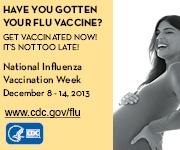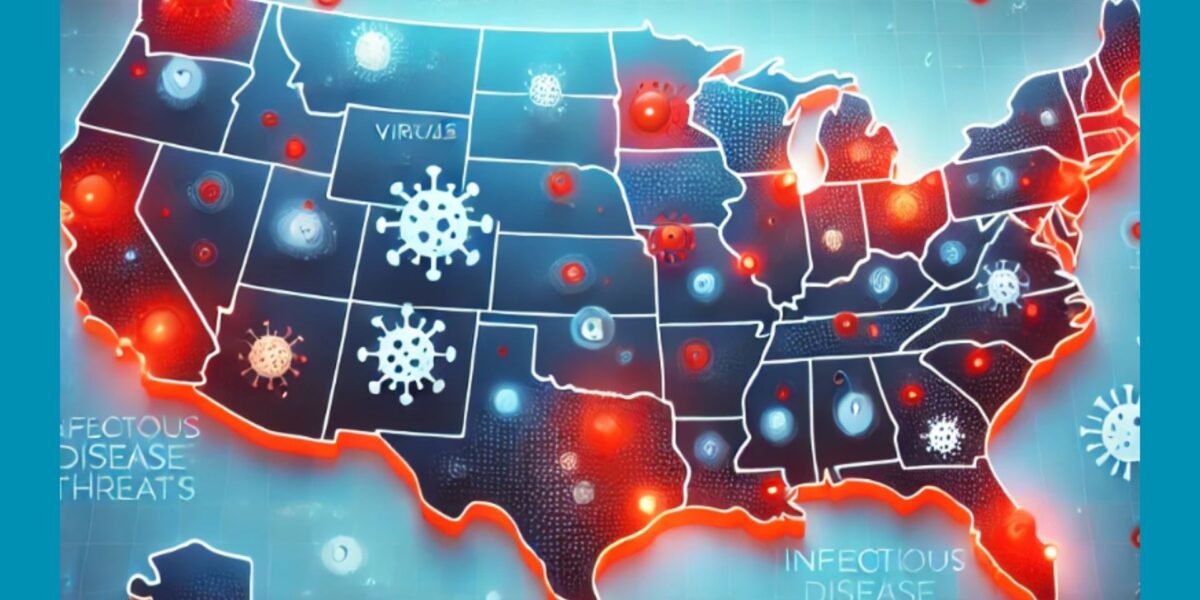
 Pregnancy is a time for big changes—a whirlwind of emotion, anticipation, and uncertainty. But one thing that is certain during this time is the importance of getting a vaccine to help protect both the pregnant woman and her baby against influenza (flu).
Pregnancy is a time for big changes—a whirlwind of emotion, anticipation, and uncertainty. But one thing that is certain during this time is the importance of getting a vaccine to help protect both the pregnant woman and her baby against influenza (flu).
Flu is a contagious illness caused by influenza viruses that infect the nose, throat, and lungs. Pregnant women with the flu have a greater chance of developing serious illness—including pneumonia and premature labor and delivery—that can impact their health as well as the health of their unborn baby (compared with pregnant women who don’t get the flu). The risk from the flu is greater for pregnant women because even normal pregnancy can reduce the ability of the lungs and the immune system to work normally. The good news is that pregnant women can protect both themselves and their unborn babies by getting a flu vaccine.
Each year, too many children die from influenza. Young children, whose immune systems are still developing, are at high risk for flu-related complications including pneumonia, and babies younger than 6 months of age have the highest risk of being hospitalized from flu complications. But when a mother gets a flu shot during pregnancy, she not only protects herself but also her baby for up to 6 months after birth.
Another way to protect the baby is for fathers, brothers, sisters, grandparents, and babysitters—anyone who cares for or is in close contact with the baby—to get vaccinated against the flu. Anne Schuchat, MD (RADM, USPHS), Assistant Surgeon General of the US Public Health Service and CDC Director of the National Center for Immunization and Respiratory Diseases, says, “Babies younger than six months can get very sick from flu, but are too young to get vaccinated. The best way to protect them is to have their caregivers and close contacts vaccinated.” This concept is known as “cocooning,” because the baby is surrounded by close contacts who are less likely to pass flu on to the baby since they’ve been vaccinated.
While CDC is encouraging everyone 6 months and older to get vaccinated against the flu this and every flu season, there is a special message for pregnant women and parents: “Don’t pass up this easy way to protect yourself and your infant against the flu,” says Dr. Schuchat.
Flu symptoms may include fever, body aches, chills, extreme tiredness and weakness, and sudden onset. Some may also experience diarrhea and vomiting. Pregnant women and parents of children younger than 2 years of age should call their doctor or nurse right away if they, or their young children, become sick. A doctor may prescribe antiviral medications that can treat influenza infection.
Annual vaccination continues to be the best protection against the flu. Get yourself—and all children 6 months of age and older—vaccinated against the flu to help keep all family members healthy this flu season. Flu vaccine is now offered in many locations–the vaccine finder at vaccine.healthmap.org can help to locate nearby flu vaccines. For more information about influenza or vaccination, talk to your doctor or visit www.nfid.org/influenza or www.cdc.gov/flu.
Recognizing the importance of maternal immunization, NFID, in collaboration with the American College of Obstetricians and Gynecologists (ACOG), American Academy of Pediatrics (AAP), and Centers for Disease Control and Prevention (CDC), launched a Family Vaccines Initiative to encourage pregnant women and women planning to become pregnant to get recommended vaccinations to protect themselves and their babies, and to become vaccine advocates for their families. As part of the initiative, NFID is developing an online Family Vaccine Resource Center, a collection of resources about vaccine benefits and recommendations, to educate expecting or new mothers/parents as well as the healthcare professionals who serve them.
To join the conversation, follow us on Twitter (@nfidvaccines) and use the hashtags #fightflu and #NIVW2013, like us on Facebook, and join the NFID Linkedin Group.
Related Posts

News Round-Up: Infectious Disease Threats
According to NFID website poll, there are several worrisome infectious disease threats. Read recent news on topics of greatest concern, including avian influenza (bird flu), measles, and respiratory syncytial virus (RSV) …

Vaccines and Heart Health: A Vital Connection
Heart disease can increase the risk of serious or fatal complications from respiratory diseases including COVID-19, flu, and RSV

Harnessing the Power of Local Data
NFID dashboard aims to empower stakeholders with hyperlocal data to increase US adult respiratory vaccine uptake
